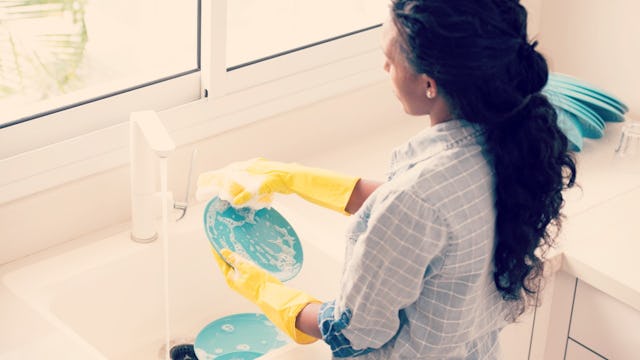What My Dirty Dishes Taught Me

I grew up on a house where a dirty dish never sat for long. As soon as we finished eating, our plates were immediately loaded into the dishwasher. The pots and pans were always washed, dried, and put away right after dinner. If I left a glass on the counter for later use, it was gone by the time I came back for it.
My mom stayed at home when we were growing up, and one of the advantages of that was that our house was always clean and the dishes were always done. I love having a clean house and always feel more at peace when my home is tidy.
When I become a mother, I had the same expectation that my house should always be clean, the dishes always done. Tidiness was a badge of a “good” mom. After all, that’s what my mom did, and she was a good mom. I hung my worthiness as a mother on how clean my house looked and how few dirty dishes sat in my sink.
Do you ever notice the expectations we put ourselves as mothers? The long list of things we think we “should” do to be a good mom?
When I became a single mother, working full-time, raising two children on my own, I quickly hit a wall of complete exhaustion and overwhelm trying to keep up with all the expectations I had on myself. Some nights, it took all the energy I had left just to put dinner on the table and get through homework, baths, and the bedtime routine. I would force myself to clean up because that’s what I was “supposed” to do. But I started to resent the dirty dishes.
The dirty dishes are a metaphor for my expectations. Through my recovery process, I have learned that I have very high expectations of myself, and others, which has affected my relationship with myself and my family. I struggle with perfectionism and the belief that I have to do things perfectly to earn love and acceptance. This belief has led to a deeply ingrained message that I’m not “good enough.”
I’m learning to look at my expectations of myself. I’m trying to lower the bar a little, to notice when perfectionism flares up, and to accept that my best really is good enough.
There’s a saying in recovery that “expectation breeds resentment.” When I approach the dishes, or any task for that matter, as something I “should” do, I set myself up for failure if I don’t get accomplish those tasks. If I expect somebody else to do something, and they don’t, then I set them up for failure. And I resent failure and disappointment.
A simple shift in mindset has helped me tremendously. Instead of telling myself what I should do, I ask myself what I want to do. What do I have the energy to do? What feels most important? What is my priority in that moment?
I give myself permission to choose, to trust myself to do what feels right, to loosen my grip of control.
Some nights I have the energy to clean up the dishes right after dinner, and that feels great. (I love waking up the next morning to a clean kitchen!) On those days I feel emotionally available and connected, and I enjoy the mindless chore that gives my brain a break.
But many nights I’m so exhausted from my day, and I give myself permission to leave the dirty dishes in the sink until I’m ready to face them. I choose instead to give what little energy I have left to reading to my girls, tucking them in bed, and taking care of myself before I go to bed. I choose to have compassion for myself, to lower my expectations, to accept that I’m doing the best I can, and to trust that the energy to do the dishes will come.
And those dirty dishes always get done. When my energy returns and I choose to face them, I feel so grateful that I took care of myself first, that I made myself and my girls a priority. When I give myself a choice instead of forcing it to get done through my exhaustion, I actually enjoy doing the dishes and appreciate having a clean kitchen so much more.
My dirty dishes taught me to take care of myself first.